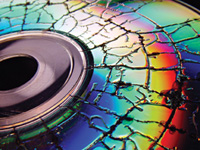
We’ve all read newspaper stories of faulty motor vehicle recalls and the lousy reviews about your favourite restaurant. The car you’ve always trusted at the turn of the key turns out to be less reliable than you thought, the dinner at your fancy restaurant date turns up cold, and the whole consumer experience leaves you with a bad taste in your mouth.
Sadly, if you scan the music and hi-fi forums, you’re likely to find it’s happening with substandard CDs too. Unhappy music fans are fast losing confidence in a product they’d always trusted for its audio quality. Worse still, fans don’t realise that what they’re hearing through their speakers or ear buds is far worse than what the recording engineer would have – or should have – heard through the studio speakers.
So what’s all this noise about? Is it about poor engineering, poor mastering, poor replication or out-of-spec CDs and DVDs? Could it be the dumbing down of engineering standards? Or is it about consumers who have come to accept poor audio without the higher standards of the past as a benchmark? We believe that all of these are contributing factors.
The replicator of the CD and DVD discs also has a responsibility to adhere to a critical list of specifications to ensure that a consistent quality product is produced – every single time!
Quality can be compromised for any number of reasons. It can happen when the audio recording levels have been drastically increased (maximised) at mastering stage. A popular technique used to make a recording sound loud, maximisation can also result in distortion which will be audible on the store-bought CD.
Poor manufacturing practice is another issue. Replicated CDs must conform to the strict ‘Red Book’ manufacturing guidelines to ensure consistent audio quality and playability. Each CD stamper should be thoroughly tested to ensure that all discs replicated are up to standard. Quality control throughout the manufacturing process is important to avoid a defective batch of discs being despatched.
So what are the consequences of a bad run of CDs? Our engineers know that a poorly made CD will sound bad for starters. The CD may have a muddy or distorted quality to it that wasn’t on the original studio master. Or it may just sound different. Poor sound quality may not be as obvious on a tiny set of ear buds or through a low-fi car stereo, but will be noticeable on a quality sound system. Imagine then, the disappointment for someone paying good money for a CD and rightfully expecting superior sound to that of a downloaded mp3.
Another major issue with out-of-spec CDs and DVDs is that they may play erratically, or not at all. Worse still, these discs may play without a hitch in one player, but not at all in another. Ironically, high-end players tend to have more issues with out-of-spec discs than cheaper ones, as they are designed to read information on the disc more precisely. Therefore customers are likely to assume that their player is the cause of the problem, not realising it is the disc itself.
So how have these defective discs ended up on our shelves? Put simply, manufacturers have let quality control and equipment maintenance slip in a bid to reduce costs. Some CD manufacturers either don’t have the requisite mastering test equipment on-site to make the appropriate checks, or they are knowingly manufacturing discs widely out of specification believing that the return of a few faulty discs isn’t really significant. For consumers who do persist in returning a temperamental disc to their retailer, they are often refused a refund or exchange on the basis that nothing appears to be obviously wrong with it, especially if it plays on the store’s player. Many production and record companies would be (or at least should be) horrified to find that the products they are releasing to market are sub-standard, but unless they receive a significant number of complaints they won’t react.
So what can you do? If you’ve had a run of discs replicated and you aren’t satisfied with the result, ask your replicator to test the master, explain the results and confirm what needs to be done to rectify any errors.
If you’ve purchased a disc you suspect has problems, look for the name of the manufacturer on the inner ring on the underside of the disc. Either contact them directly, or return your disc to the retailer. In some cases different batches of the same title are made by different replicators, so you could request a CD made by a different manufacturer to the one you bought originally.
Remember whether it’s your car, your restaurant meal or your CD or DVD, every industry has a responsibility to produce a product to the recognised quality standards. With CDs and DVDs you owe it to yourself and the wider public to accept nothing less.
For any further information regarding CD replication, specifications and testing or if you wish to discuss issues raised in this article please contact sales@stebbing.co.nz